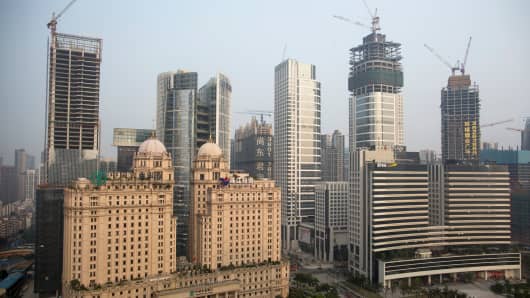China's biggest banks wrote off more than $9.5 billion in bad loans last year, more than double the year before, according to by the Financial Times.
But with its economy slowing, some observers wonder whether China's technocratic leaders can successfully engineer a "soft landing" as they try to put the brakes on an era of go-go lending.
Read MoreBad loan writedowns soar at China banks
"They are clearly are allowing a bit more air out of the system—they have to. But it's really a risky process," said Maarten-Jan Bakkum, a market strategist with ING Investment Management. "If you really allow overcapacity companies to go bankrupt, if you let corporate bonds default, that means that you risk a bigger systemic crisis."
That uncertain outlook has weighed on financial markets around the world, and focused attention on the potential impact of a wider restructuring of China's bad debts.
Still, China has built an enormous financial cushion to weather any coming credit storm: some $3.8 trillion in foreign exchange reserves at the end up last year, the largest in the world. And while economic growth is slowing, China's trade surplus with the rest of the world rose 13 percent last year to $260 billion, the highest since the Great Recession.
Those financial resources, combined with China's tightly managed brand of "state capitalism," should help buffer the impact of looming defaults, according to Paul Donovan, global economist at UBS Investment Bank in London.
"If anything even begins to look like a systemic problem, it's not allowed to happen," he said. "Trusts in difficulties? No, absolutely not. An obscure company that no one's ever heard of gets paid 90 cents on the dollar? Yes, because that shows that we're keen on (reform)."
But even if the financial system can stand up to the coming stresses, China's slowing economy and tighter credit present an even bigger challenge for Beijing's new leaders.
Until recently, popular discontent with corruption, pollution, wealth inequality and other social strains have been eased somewhat by the longer-term progress in lifting a billion citizens out of poverty.
As growth slows, Beijing's leaders can't afford to slow the spread of the fruits of Deng's reform plan to the Chinese people.
"They've got some tumultuous times ahead, and they're not going to be growing to 7.2 percent—although they'll tell the world they are," former Honeywell CEO Lawrence Bossidy told CNBC. "When the growth slows, it's going to cause internal turmoil. They're going to get through it. They have big some reserves. But they'll have tougher days. "
—By CNBC's John Schoen. Follow him on Twitter @johnwschoen or email him.



